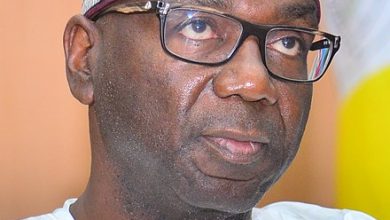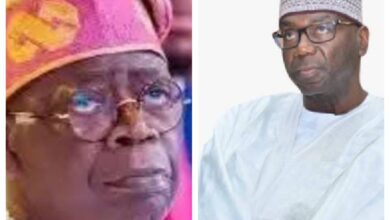Re: How Bolaji Abdullahi destroyed Colleges of Education in Kwara

By Abdulsomad Olota
Zafon Ruiz C. said “When everyone is determined to present someone as a monster, there are two possibilities: either he is a saint or they are not telling the whole story”
The recent defamatory journey embarked upon by one online medium identified as “the conscience” does not only question credibility of the medium’s name but also their professionalism. Perhaps they can be dubbed as “baby in the profession.”
In line with the aformentioned quote, the blogger and his source attempted to create a false image of Mallam Bolaji Abdullahi and also propagated half of the story. Perhaps, it’s to ridicule people’s eidetic ability of the past.
If few people are suffering from selective amnesia, is it not right of others, such as “the conscience” to remind such people of the accurate and true account of history instead of using such to form a basis for a political propaganda? Maybe, the medium also belongs to the fewer ones with the memory ailment earlier identified.
It’s however upon sane and conscience writers to set the record straight by reminding the people of how greatly effective Bolaji Abdullahi’s reform of Colleges of Education was and still is. The bold step taken by Kwara State under the leadership of Dr. Bukola Saraki to revitalise public education while Bolaji Abdullahi was the Commissioner of Education, Science and Technology was trailblazing effort. A reform which was endorsed as best practice by the federal authorities and the donor community in Nigeria as at the time, is what one Mr. Kamaldeen tagged as destruction. It’s laughable and unwise from the part of whoever is behind the purported teacher because these are discussions they shouldn’t have mentioned, it’s to Omoluabi’s advantage for it only reminds people of how innovative and creative Bolaji Abdullahi is at resuciating a collapsing structure and system. Even a Professor and gubernatorial candidate of an opposition party, Prof. Oba Abu couldn’t deny the success of the education reform under Dr Saraki’s leadership and most particularly commended the tertiary reform undertaken by the then Ministry of Education under Bolaji Abdullahi’s watch. This further shows that, at this time, Mallam Bolaji’s big idea is mostly needed in the country to turn things around for better again.
Part of the statement credited to Mr. Kamal alleges that Bolaji’s leadership caused reduction of the intake of students which consequently reduced the Institution’s revenue. He went further by saying that, Colleges of Education prior to Bolaji’s reform had over 40,000 students which after the reform had less than a thousand students. A statement which is not only lame and funny but also shows indication of a very sharp intellectual decline, the speaker and those who believed and propagated such narration are knucklehead.
In 2008, Mallam Bolaji Abdullahi came up with a policy named Education Strategic Plans (ESP) to rescue Kwara State from expensive yet unproductive education. The ESP which was second of such edition in Kwara State was structured around six key focal areas, identified as priorities which are:
1. Equitable access
2. College of Education Turnaround
3. Teacher Quality Improvement
4. Strengthening Inspectorate Capacity
5. Institution building
6. Funding
In the 2005-06 data baseline, 31,440 students enrolled in the three colleges of education in Kwara State while 9,400 graduated in that year. Unfortunately, Government was only open to employing 2,600 basic school teachers at that time; which gives a surplus supply of nearly 7,000 trained educationist unutilised for curriculum delivery in the state. This was one of the impact of overpopulation in our Colleges of Education.
According to sources, the Education Strategic Plan (ESP 2008), the staff: student ration was supposed to be 84 students to one lecturer for the course of teachers education. Unfortunately, in 2008 there were over 600 students to a lecturer, surpassing the capacity of available classrooms. Numbers such as this overburdened colleges of education to the extent that students were forced to listen to lectures through open windows outside lecture theatres. Those with this experience are still alive. Hence, the urgent need for the government to be proactive in order to curtail the excesses and improve the quality of education received in colleges of education.
Additionally, in 2008, there were over 31,000 student teachers, with only 1,202 basic schools available, simple arithmetic suggests that it was logistically impossible to arrange any quality form of teaching practice during their course of study, which forms an integral part of community development function of tertiary institutions. Correction of such an intimidating large surplus of teachers was a major policy challenge. Hence, the action to reduce the over-supply of pre-service students, strengthening college management and funding, developing best practice methods and harmonizing the curriculum.
Mallam Bolaji Abdullahi understood that there was more to tertiary education restructuring than business and revenue generation, on education one must not think of profits but quality delivery. If the quality of school teaching was to improve, the smaller numbers being trained needed better staff: student ratio and facilities. As at then, the Education Trust Fund (ETF) was overburdened with funding education in the country, they were overloaded and lacked concentration in funding, until its dissolution into various agencies in 2009/10 when the efforts for establishing KWASU commenced. The drive for University Education and scaling up enrolments in Polytechnics got committed attention.
Consequently, in order not to dismiss their commitment to “Education For All” agenda, Mallam Bolaji Abdullahi under the leadership of Dr. Bukola Saraki provided other viable ways to limit the effect of reduction in colleges enrollment by: establishing Kwara State University, scholarships for some indigenes to study outside the state, upscaling enrollment in Kwara State Polytechnic and use of Unilorin old campus to support the state tertiary institution. It was a solid plan for expansion and scope of our education.
The success of the reform was overwhelmingly felt that most states of the federation started requesting for the technical know how to have a similar outcome and Kwara Ministry of Education under Mallam Bolaji Abdullahi had even huge responsibility of training many personnel from other states of the country.
It is quite unfortunate one Mr. Kamal suddenly turned Kwara Wikipedia whose groundless accusation became a reference point for an online medium whose action portrays opposite of their supposed identity. Such a “conscienceless” publication! I hope the editor(s) see through the sincerity of my concern and be “conscientious” in their subsequent publications
*Abdulsomad Olota writes from Oke-Oyi.




